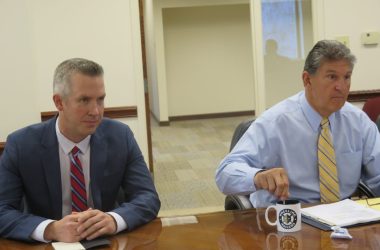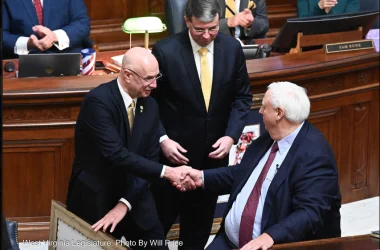By DANYEL VanREENAN
The Journal
CHARLES TOWN, W.Va. — In light of the recent national retraction from the Paris Climate Agreement, the Jefferson County branch of the West Virginia NAACP is taking a stance against environmental issues that disproportionately affect low income neighborhoods and communities of color, according to Jefferson County NAACP environmental justice chair Daniel Chiotos.
The Jefferson County branch of WV NAACP issued a recent statement in response to President Donald Trump’s decision to withdraw from the Paris Climate Agreement.
“The Jefferson County NAACP is determined to continue pushing for clean energy and for environmental justice in the wake of the announcement by President Trump that the United States will withdraw from the Paris (Climate) Agreement,” the organization said in a news release. “The Jefferson County NAACP believes that the communities of West Virginia — especially those families impacted by the many decades of decline of the coal industry and those communities impacted by pollution from fossil fuel industries — have earned a commitment from the federal government to a diversified economy that sees West Virginians as more than fodder for coal operators.”
Chiotos said the Jefferson County NAACP branch is currently investigating environmental issues in the Eastern Panhandle, including polluted drinking water, brownfields locations, electric rate increases on low income communities and the development of a low-cost renewable energy economy in Jefferson County.
“In every case, our local Branch is serving as a megaphone for the community to use as it develops its own practical vision of clean energy, clean air and clean water here in Jefferson County,” Chiotos said.
Chiotos said the local NAACP became involved in environmental issues because low income and minority communities nationwide have faced disproportionate exposure to pollution, crime, substandard living conditions and more.
“African Americans who reside near energy production facilities including coal fired power plants, nuclear power plants or biomass power plants are more likely to suffer the negative health impacts of prolonged exposure to smog, lead, asbestos, mercury, arsenic, sulfur dioxide, nitrogen oxide and other toxins than any other group of Americans,” said the NAACP’s 2014 Just Energy Policies report.
The Jefferson County NAACP recently formed an Environmental Justice Committee to tackle the issue of affordable electricity, and the committee plans to launch a local campaign to advance the health and finances of low income residents in the Eastern Panhandle by reducing pollution.
George Rutherford, president of the Jefferson County branch, said low income and minority residences could install solar panels and seal buildings to lower energy bills and pollution. However, he thinks leaving the Paris Climate Agreement is a step in the wrong direction.
“Our nation must do right by West Virginia by prioritizing the rapid expansion of a clean energy economy that can build lasting wealth in our mountains, valleys and hollows,” Chiotos said.
The Jefferson County NAACP meets on the second Tuesday of every month at St. Phillips Church at 411 S. Lawrence St. in Charles Town. The Branch’s Environmental Justice Committee can be reached by email at [email protected] or by calling 304-535-8150.
See more from The Journal





